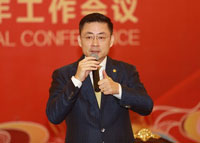Trending
Troubling sign: HNA Group turns to employees to raise funds
Debt-saddled company soliciting what are essentially high-interest loans from workers

HNA Group, which is saddled under $90 billion worth of debt from its global buying spree, is turning to company employees to help raise funds.
The Chinese conglomerate sent emails offering an “employee treasure” product – essentially a high-interest loan workers make to their employer, the New York Times reported.
The company offered a return of 8.5 percent for employees who handed over $1,500, and one email dangled a return as high as 40 percent for employees who ponied up $15,000.
HNA has long offered employees investment opportunities to encourage them to take part in the company’s success. But the company’s emails do not offer ownership stakes such as stocks.
And while Chinese companies have often looked toward individual investors or their own employees to raise money, China finance experts say such moves can be signs of a problem.
“It’s a desperation measure when companies really have no other source of financing and they are stuck,” said Anne Stevenson-Yang, co-founder of the corporate research firm J Capital Research.
HNA is struggling under the weight of the debt it took on to make acquisitions such as stakes in Hilton Hotels and Deutsche Bank. The company earlier this year raised corporate debt by borrowing against its Hilton stake for the third time.
To shed debt, HNA has also said it will sell as much as $6 billion in real estate holdings, though that does not include its trophy tower at 245 Park Avenue, which it bought for $2.21 billion last year.
Earlier this year, the company had not paid returns to investors – some of whom were HNA employees – in an online lending platform it owns.
Thomas Clare, an attorney for HNA, said the company “has never approached the offering of these products and opportunities as a financing mechanism, as the amounts contributed by HNA employees to these opportunities are a very small percentage of the funds raised.” [NYT] – Rich Bockmann




